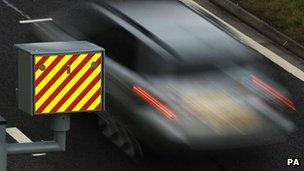Speeding penalty point dodgers face prison, police warn
- Published

Police say drivers dodging penalty points and a £60 speeding fine could face a prison sentence instead
Police are prosecuting growing numbers of criminals who help motorists dodge speeding penalty points.
Those taking part believe the crime - which often involves blaming fictitious drivers for the offence - is low risk.
But police say it is allowing dangerous drivers to avoid being banned and warn those caught could be jailed.
In one case a man from Greater Manchester was jailed for seven years for helping around 700 motorists avoid penalty points.
He was jailed in January of this year after admitting a string of offences including conspiracy to pervert the course of justice.
The case involves one of five alleged speeding point gangs investigated by a specialist unit from Greater Manchester Police in the last two years.
Thames Valley Police are also targeting criminal gangs involved in this type of crime. The police say they are prosecuting both the drivers and those who lie on their behalf.
'On the increase'
Greater Manchester Pc Vaughan Davies said: "It does seem to be on the increase that people are paying for this service.
"If you lie on the forms sent to you by the police you face going to prison - all for three points and a £60 fine," he told the BBC's5 live Investigatesprogramme.
When a driver is caught on camera for speeding or going through a red light, the registered owner of the car is sent a notice of prosecution letter asking them who was driving the car at the time.
5 live Investigates was told of a number of different methods used by motorists who seek to avoid having penalty points added to their driving licence.
In some cases motorists will fill in the forms themselves falsely claiming someone else was driving their car; in other cases the forms are given to criminals who put fictitious names and addresses on them.
Criminals have also been caught out after falsely submitting details of people living abroad in the hope that it will be more difficult for police to check their claim.
They also use stalling techniques because they know that in most cases police have only six months in which to take action against the driver and some forces do not have the resources to investigate every case where a driver has claimed someone else was driving their car.
5 live Investigates spoke to a taxi driver who provided false information to the police to allow 150 other drivers to dodge speeding points over a six-year period.
He began doing it for other people after he was caught speeding himself and a friend told him how to avoid having penalty points added to his licence.
Charging motorists £200 a time, he said it was "easy money" for doing something he did not think was wrong at the time.
"It wasn't like I was stealing from a shop or anything," he said.
New police database
He has since changed his mind after being caught by police and sent to jail for 16 months for perverting the course of justice.
"I'm not going to do it again, even if someone offered me £1,000 - I don't want to go to prison.
"To be honest, I still get calls today about it and I say 'no, don't talk to me about this'."
Deputy Chief Constable Suzette Davenport from the Association of Chief Police Officers (Acpo) says it is important this type of crime is not trivialised.
"The safety of the public on our roads is paramount and for that reason we are dedicated to identifying and prosecuting those who knowingly put others at risk," she told the BBC.
"Those who try to hide offending drivers from us, whether by falsely nominating [another driver] or sharing points with a friend or relative, put the public at risk by helping bad drivers avoid the consequences of their actions.
"Those who do it can expect to go to prison and those who organise such scams for profit will go to prison for many years.
"A new computer database developed by the National Police Improvement Agency is being introduced to make it quicker and easier to establish links across force boundaries," explains Dep Ch Con Davenport.
"This, coupled with increased use of front-facing cameras, will make providing false nominations a very risky business."
Find out more on5 live Investigateson Sunday, 18 March at 21:00 GMT onBBC 5 live.
Listen again via the5 live websiteor by downloading the 5 live Investigatespodcast.
- Published4 March 2012
- Published25 November 2011
- Published20 March 2011